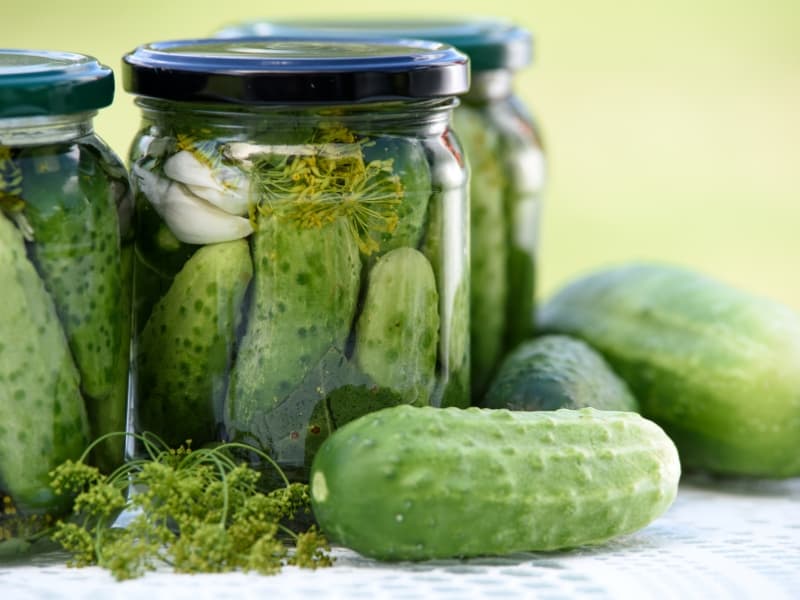Pickle is one of the most popular condiments. Pickles have a distinctive vinegary and salty flavor that livens up cheeseburgers, sandwiches, tuna salads, and many other dishes.
If you enjoy pickles often, you might be wondering whether they are a vegetable or fruit.
So, is pickle a vegetable? The short answer is that pickles are fruits, but also vegetables and berries. A pickle is essentially a pickled cucumber, which is botanically a fruit. Scientifically, a fruit is a seed-bearing portion of a flowering plant formed from the ovary. A vegetable is an edible part of any plant.
It’s important to note that there is a huge difference between the botanical definition and the way most people think about fruits and vegetables.
This article tells you everything you need to know about pickles. We’ll share how pickles are made and whether they are good for your health.
What is a Pickle?
A pickle is a cucumber that has been preserved in vinegar or brine. The term pickles can be used for other vegetables and fruits that have been pickled.
Pickles are made from various vegetables. Carrots, asparagus, onions, radishes, cauliflower, cucumbers, and green beans can also be preserved using vinegar or brine.
Still, the cucumber remains the most popular type of pickled vegetable in the United States.
Any type of cucumber can be pickled. But Kirby and gherkin are the two most commonly used varieties. Being thick and small, these varieties are better for pickling than slicing cucumbers.
Pickles are a very versatile food item. Use pickles to top sandwiches, cheeseburgers, and pizza, in salads and pies, or eat them plain as a snack.
Is a Pickle a Cucumber?
All pickles are cucumbers. Cucumbers become pickles through a fermentation process.
To make pickles, fresh cucumbers are soaked in vinegar or saltwater brine. In time, the fresh cucumbers will ferment and turn into pickles.
How are Pickles Made?
Pickles are made through pickling, a process of preserving food. Depending on the method used to pickle food, this process can last anywhere from several days to a few months.
Pickles can be preserved using two distinctive pickling methods:
1. Using Vinegar to Pickle Cucumbers
Using vinegar is a popular and simple method of pickling cucumbers. For this pickling method, you’ll need vinegar, water, and salt. However, some people also like to add different herbs and spices to intensify the flavor and aroma of pickles.
Pickling cucumbers is a pretty straightforward process that starts with bacteria. These bacteria live on the cucumbers’ skins and aren’t harmful to humans.
Vinegar brine creates an environment in which lactic acid bacteria grow and other, unwanted bacteria die. The lactic acid bacteria make the sugar from the cucumbers into lactic acid and give cucumbers a sour flavor.
Soaked cucumbers are left in a sealed airtight container for several weeks to ferment. The type of vinegar brine mixture used and the time the cucumbers are left to ferment will determine their taste.
2. Using Salt to Pickle Cucumbers
Fermenting cucumbers with salt is a traditional method of preserving food. You’ll only need salt and water to pickle cucumbers this way.
Add salt and water to a cup and stir to create saltwater brine. Submerge the cucumbers in the brine and keep them in airtight jars in a cool area for 3 to 5 days, or until the cucumbers start to taste like pickles.
Are Pickles a Pickled Vegetable?
Pickles are the most common type of pickled vegetable in the United States. Various vegetables, other than cucumbers, can be pickled in vinegar, brine, or other solutions.
What Food Group is a Pickle?
Pickles are both a fruit and a vegetable. Pickles are made from cucumbers, which are botanically a vegetable and a fruit.
Cucumbers are classified as botanical fruit because they have seeds and grow on a flowering plant.
Any edible part of a plant is classified as a vegetable. Considering that the cucumber is an edible portion of the cucumber plant, it’s safe to think of it as a vegetable.
Is a Pickle Healthy?
Pickles are low in fat and calories. But loaded with vitamins and minerals. Eating pickles can provide several health benefits, including:
- Lower risk of heart disease
- Reduced cell damage
- Better digestion
- Reduced insulin spikes
Pickles are full of vitamins A, K, and folate. They also contain minerals like potassium and phosphorus. Pickles are a source of beta-carotene. This antioxidant is linked with a lower rate of diabetes type 2 and age-related muscular degeneration.
On the downside, pickles contain large amounts of sodium. One large dill pickle has ⅔ of the amount of sodium an adult person needs for a whole day.
Eating too many pickles can increase your sodium levels and raise your blood pressure. Having high blood pressure increases the risk of heart attack, kidney disease, stroke, and diabetes.
Are Pickles Good for Your Gut?
Fermented pickles support gut health in several ways. Chock full of good bacteria, fermented pickles promote gastrointestinal health and are beneficial for gut bacteria.
Not only that but the fermentation process allows the body to absorb more nutrients with less effort. Pickles are also high in fiber, which feeds the gut bacteria and acts as a prebiotic.
Conclusion
Botanically speaking a pickle is a fruit. But, from a culinary perspective, pickles are considered a vegetable, enjoyed for their zesty, sour flavor.
Pickles are made by preserving cucumbers in vinegar or brine. Although all cucumbers can be pickled, not all pickles are cucumbers.
The term pickles is used to describe other foods that can be pickled. This term encompasses various pickled vegetables including cabbage, onions, carrots, cauliflower, asparagus, peppers, green beans, and asparagus.
The fact that pickles are classified as fruit shouldn’t stop you from enjoying this tasty condiment in a sandwich or a cheeseburger.
Related Articles:



